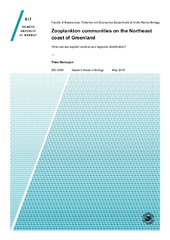| dc.description.abstract | Most studies on zooplankton investigate the famous, and omnipresent, Calanoid copepods Calanus spp., because they are abundant, and constitute the major trophic link in marine ecosystems. Indeed, Northeast Greenland is located on the crossroad of Arctic and Atlantic waters which, potentially, can lead to a high biodiversity originating from different domains of marine life. However, there are very few zooplankton studies from Northeast Greenland and the predicted strong impact of climate change could modify drastically the community composition and interaction in this region. The concern for climate change is growing bigger each day, and in order to estimate its impact, time series are needed. The aim of the present study is to create the first large-scale baseline of zooplankton distribution, taxa composition and abundance in Northeast Greenland. We explored five very different habitats in Northeast Greenland (latitudes 76-79 °N), including an isolated fjord (Bessel Fjord), an open bay (Dove Bugt), as well as banks, troughs and shelf locations offshore. We investigated patterns of biodiversity and abundance across locations. Coastal locations showed a higher zooplankton abundance compared to the offshore shelf locations. On the other hand, biodiversity of zooplankton communities seemed to increase from coastal towards offshore locations.
Besides using a zooplankton net (WP-2) and a Video Plankton Recorder (VPR) to collect data on biodiversity and abundance, we used the CTD data of the VPR to correlate each zooplankton taxon with in situ environmental parameters such as temperature, salinity, depth and Chlorophyll a (Chl a) concentration. In addition, the VPR data provided information about the concentration of marine snow. Some taxa revealed the same environmental preferences such as Pseudocalanus sp., Microcalanus sp., Cnidaria and Ctenophora which occurred in the upper water column at low salinity and high temperature. Ostracoda and Metridia sp., on the other hand, were present mostly in deeper waters with low concentrations of marine snow and Chl. a. Radiolaria and Oithona sp. occurred mainly in cold waters, whereas Appendicularia and Echinodermata were tightly linked to high concentrations of marine snow and Chl a concentration.
Climate change affects zooplankton communities around the world. However, the Arctic seas are particularly susceptible to ocean warming, and therefore, it is crucial to build a baseline and maintain long-term monitoring of the marine biota in Northeast Greenland. | en_US |


 English
English norsk
norsk
